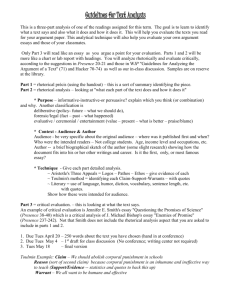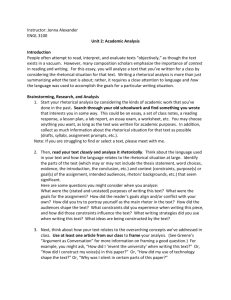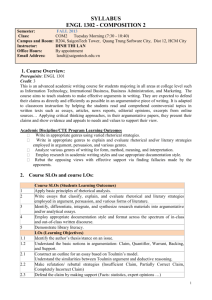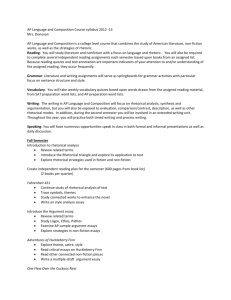English 102 Course Description and Required Elements
advertisement
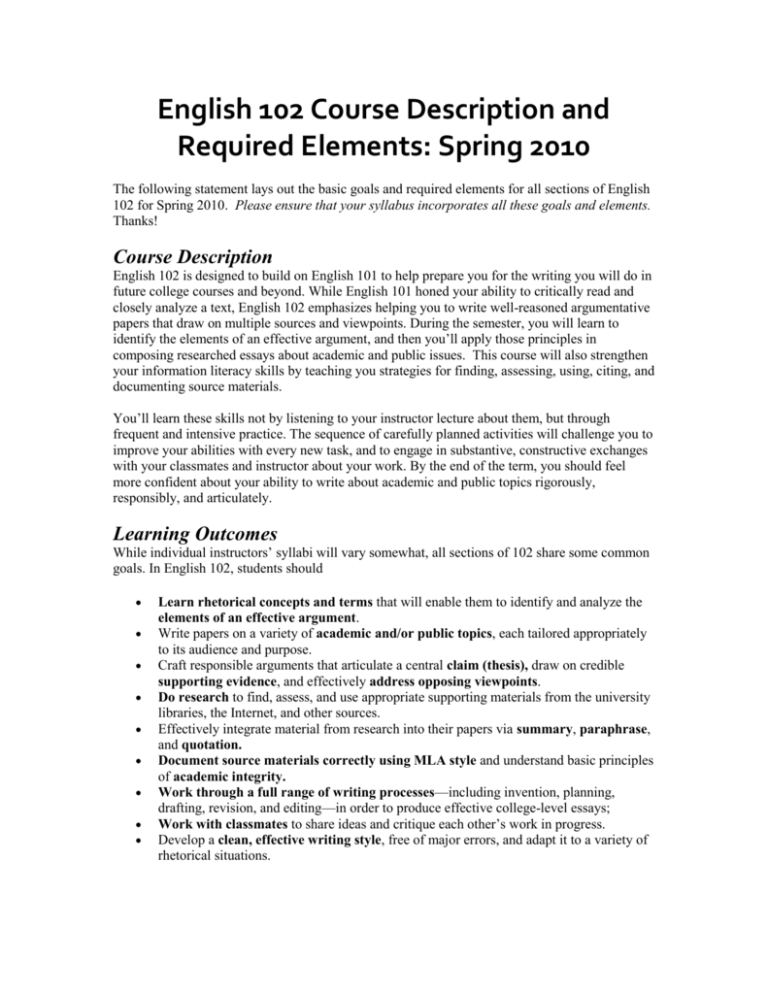
English 102 Course Description and Required Elements: Spring 2010 The following statement lays out the basic goals and required elements for all sections of English 102 for Spring 2010. Please ensure that your syllabus incorporates all these goals and elements. Thanks! Course Description English 102 is designed to build on English 101 to help prepare you for the writing you will do in future college courses and beyond. While English 101 honed your ability to critically read and closely analyze a text, English 102 emphasizes helping you to write well-reasoned argumentative papers that draw on multiple sources and viewpoints. During the semester, you will learn to identify the elements of an effective argument, and then you’ll apply those principles in composing researched essays about academic and public issues. This course will also strengthen your information literacy skills by teaching you strategies for finding, assessing, using, citing, and documenting source materials. You’ll learn these skills not by listening to your instructor lecture about them, but through frequent and intensive practice. The sequence of carefully planned activities will challenge you to improve your abilities with every new task, and to engage in substantive, constructive exchanges with your classmates and instructor about your work. By the end of the term, you should feel more confident about your ability to write about academic and public topics rigorously, responsibly, and articulately. Learning Outcomes While individual instructors’ syllabi will vary somewhat, all sections of 102 share some common goals. In English 102, students should Learn rhetorical concepts and terms that will enable them to identify and analyze the elements of an effective argument. Write papers on a variety of academic and/or public topics, each tailored appropriately to its audience and purpose. Craft responsible arguments that articulate a central claim (thesis), draw on credible supporting evidence, and effectively address opposing viewpoints. Do research to find, assess, and use appropriate supporting materials from the university libraries, the Internet, and other sources. Effectively integrate material from research into their papers via summary, paraphrase, and quotation. Document source materials correctly using MLA style and understand basic principles of academic integrity. Work through a full range of writing processes—including invention, planning, drafting, revision, and editing—in order to produce effective college-level essays; Work with classmates to share ideas and critique each other’s work in progress. Develop a clean, effective writing style, free of major errors, and adapt it to a variety of rhetorical situations. Required Elements Assignments and texts for English 102 will vary somewhat from instructor to instructor. However, the First-Year English Program requires that all sections adhere to the course goals above and incorporate the following: I. Focus on Argument and Persuasive Writing Most of the writing students do in college (and beyond), regardless of their major, will ask them to organize information from sources in support of central thesis or claim—in other words, to craft a well-supported argument. English 102 helps to prepare students for future writing by giving them a general understanding of how effective arguments work, so that they can recognize irresponsible versus sound arguments when they encounter them in their reading and research and so that they can apply these principles to their own writing. In your 102 class, therefore, be sure to do the following: Introduce students to specific rhetorical concepts and terms that will help them to understand how arguments work (for example, Toulmin’s model and/or models from classical rhetoric). Reinforce these concepts and terms by using them to analyze course readings, integrating them into writing exercises and class discussions, and using them in your responses to student work. Note: The argument textbook you choose will be your primary resource for argument concepts and terminology; be sure to make good use of it. (See page X for a list of approved choices.) Choose some course readings to reinforce students’ understanding of argument and persuasion. For example, some readings might serve as models of effective, well-written argumentative prose. Other readings might be chosen to offer students opportunities to critique less successful arguments. Still others might raise issues or questions about which students can research and develop their own arguments. II. Emphasis on Research Research skills and information literacy are primary emphases in English 102. Students should leave the course with a good working knowledge of how to use the university libraries and Internet as sources of information for their writing. They should have frequent opportunities to practice assessing sources and information, selecting and integrating source materials into their writing, and citing and documenting sources appropriately. Finally, they should be able to use MLA style accurately. To that end, please Incorporate a research component into at least 3 of the major paper assignments in your course. At least two papers should require students to do substantial research (finding five or more sources relevant to their topic.) Incorporate at least one library session into your syllabus. Even better—incorporate two if you can! See the “Using Library Resources in English 102” guidelines on page XXX for more details. Regularly spend time discussing research strategies with students as they prepare for each of the major papers. Be sure to cover basic information about search strategies, source evaluation, summary, paraphrase, quotation, citation, documentation, and academic honesty during the semester. III. Writing Assignments During the semester, students should produce the equivalent of 20-30 double-spaced pages of finished written work. (This page total includes major essays or annotated bibliographies, as well as short writing assignments completed outside of class and submitted in a typed, relatively polished form.) Students should write frequently in English 102, in response to the following general kinds of assignments: Frequent short writing assignments: Students should compose frequent short pieces that enable them to practice identifying and analyzing arguments and to explore and thoughtfully develop ideas for their papers. Short assignments should give students a range of opportunities to compose both informal and formal documents and to write during class time and outside of class. Short assignments will ideally lead up to longer essays. (Examples: summaries, rhetorical analysis exercises, invention exercises, topic proposals, reports on their research, source evaluation exercises, responses to discussion or reading questions, peer critiques, group exercises.) Longer essay assignments: Students should write 4-5 longer pieces. Major assignments must include the following: Required Major Assignments 1. Rhetorical Analysis (or Analyses): One essay-length or several brief rhetorical analyses that discusses how argumentative and/or persuasive strategies work within a text or texts. 2. Exploratory Assignment: A researched essay that identifies and assesses a range of positions on an issue (for example, an exploratory essay, a bibliographic essay identifying major positions in a controversy or major interpretations of a phenomenon, a substantive annotated bibliography, a collaborative wiki page presenting a researched overview of an issue, etc.) 3. Researched Argumentative Essay: A researched academic essay that articulates and defends a claim/thesis about an issue. 4. Additional Rhetorical Analysis or Argument: A fourth major essay of your choice: rhetorical analysis or argument Additional notes: Essays assigned late in the semester may ask students to draw material from previously completed essays. For example, Essay 3 could ask students to articulate a proposal for solving a problem that they explored from several vantage points in Essay 2. Major essays should use MLA style for citing and documenting sources. One of the major essays may be a collaborative document (for example of students research a range of angles on a topic and combine them into a single document.) One of the major essays may be a multimedia project or document directed to a non-academic audience (for example, a Web page introducing the general public to a campus issue.) III. Composing Processes Each major essay should guide students through a full range of composing processes, to encourage them to fully develop their arguments and to work towards effective, polished final drafts. For each major essay, students should o Receive an assignment sheet detailing the rhetorical context, expectations, and major deadlines. o o o Have opportunities to submit and receive feedback on a topic proposal or other prewriting materials early in the process of developing the essay. Turn in and receive your feedback on at least one draft of the essay before revising it to submit for a final grade. Participate in a peer revision activity and incorporate peer feedback before submitting a final version of the essay. IV. Style, Grammar, Mechanical Conventions During 102, students should receive instruction in and opportunities to practice the following: o Using MLA conventions for formatting, citation, and documentation. o Tailoring the organization of a paper to suit different academic genres and purposes (for example, rhetorical analysis, researched argument, bibliographic essay) o Composing paragraphs and sentences that are clear, readable, and logically organized. o Using conventions of grammar, mechanics, and style typically expected in college papers. **Note: While it’s important that students learn to use these surface-level conventions, they should not be the primary focus of your feedback on and grading of their work. See “evaluation of student writing,” below.** V. Evaluation of Student Writing While we encourage you to develop routines and procedures that work best for you and your individual class, all sections of English 102 should incorporate a few basic practices (consistent with the goals articulated in the WPA Outcomes Statement for First-Year Writing Courses, see Appendix 1.) Individual Feedback, addressing “Big Picture” Issues: Please provide students with individualized feedback on their work in written comments and/or individual conferences. Research suggests that students will benefit most if you foreground “big picture” issues (such as focus, audience, logic, and organization) in your responses— especially on early drafts. Therefore, sentence-level errors in grammar, mechanics, etc., should be primarily addressed within their larger rhetorical context. Please do not devise grading systems that award automatic numerical deductions for particular errors (e.g., “minus seven points for each comma error” or “any paper with more than three grammatical errors will automatically receive an F”). Final Portfolios: At the end of the semester, each of your students should turn in a final portfolio containing all drafts and finished versions of his or her major essays. The materials in this portfolio should count for the major portion of the course grade. As in prior years, you must keep students’ portfolios on file for one calendar year after the end of the semester. Grading standards and the Academic Responsibility Statement for First-Year English are posted on the program Website, at <http://www.cas.sc.edu/engl/fye/students/index.html>



